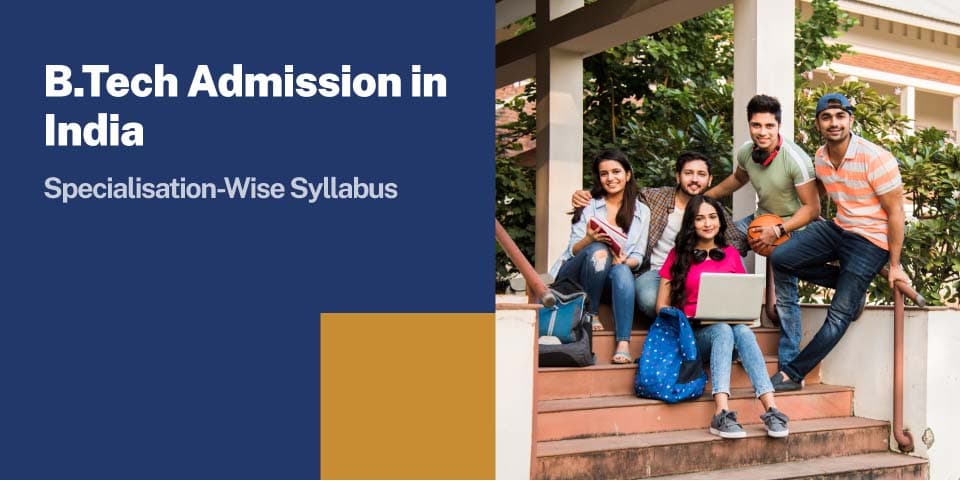5800 students unlocked their dream jobs with UG/PG programs in top colleges. Apply Now!
As technology continues to shape our world, the demand for skilled engineers and innovators grows exponentially. This journey begins with the crucial step of securing admission into a B.Tech program, a process that not only involves academic prowess but also determination and strategic planning.
In this blog, we will look into BTech Admission 2023 process in India that will help you prepare for your today’s dynamic landscape with better BTech opportunities.
BTech Admission 2026 Process
The BTech Admission in India can vary slightly depending on the university or college you are applying to. However, there are some common steps that most institutions follow.
Here's a general outline of the admission process for B.Tech degrees in India:
- Start by researching different universities and colleges that offer B.Tech programs in your preferred field of study. Consider factors like reputation, location, faculty, facilities, and placement records.
- Each institute will have specific eligibility criteria, usually based on your 12th-grade performance and entrance exam scores. The criteria may include minimum percentage requirements of 60% in subjects like Physics, Chemistry, and Mathematics.
- Most reputable engineering institutes in India require candidates to appear for entrance exams, such as JEE Main, BITSAT, or any state-level exam.
- Once you've identified the entrance exams you need to take, visit the official websites of the respective exams and fill out the application forms. This typically involves providing personal details, and educational information, and uploading documents such as photographs and signatures.
- Qualified candidates are then called for counselling sessions conducted by respective institutes. During counselling, you'll be able to select the college and branch based on your rank and availability of seats.
- After completing the admission process, you'll officially become a student of the B.Tech program. Classes and academic activities will begin as per the institute's schedule.
BTech Admission 2026: Eligibility Criteria
Here's a typical eligibility criteria outline for B.Tech admissions in India:
- You should have completed your 12th standard (or equivalent) education from a recognised board or educational institution.
- Typically, you need to have studied Physics, Chemistry, and Mathematics (PCM) as compulsory subjects in your 12th grade.
- Many institutes have a minimum of 60% requirement in the PCM subjects. Generally, a higher percentage can improve your chances of getting admitted to a reputed institution.
- For most reputable engineering institutes in India, entrance exam scores are a crucial component of the admission process. Institutes like IITs and NITs rely heavily on entrance exams like JEE Main and JEE Advanced.
- Generally, Indian nationals and sometimes foreign nationals (based on specific guidelines) are eligible for B.Tech admissions in India.
Also Read
B.Tech in Cybersecurity vs B.Tech in IT
Important B.Tech Entrance Exam Dates 2026 – Registration & Test Schedule
|
Entrance Exam |
Registration / Application Start |
Last Date to Apply |
Exam Date |
|
JEE Main |
Session 1: ~ First week of November 2025 Session 2: ~ First week of February 2026 |
Session 1: ~ December 2025 Session 2: ~ March 2026 |
Session 1: 22–30 January 2026 Session 2: 2–9 April 2026 |
|
JEE Advanced |
Tentatively in April–May 2026 for eligible candidates |
-- |
Expected in May or early June 2026 |
|
BITSAT |
Registration is expected to begin in January 2026 |
For Session 1: ~ April 2026 |
Session-1: ~ 3rd week of May 2026 Session-2: ~ 4th week of June 2026 |
|
VITEEE |
Registration & notification around November 2025 |
Last date ~ March 2026 |
Exam ~ April 2026 (20-27 April, tentatively) |
|
LPUNEST |
Phase 1: ~ October 2025 Phase 2: ~ February 2026 |
-- |
Exam dates depend on phase – exact dates TBD |
|
MHT CET |
Application ~ 4th week of December 2025 |
Last date ~ 2nd week of February 2026 |
PCB: ~ 2nd week of April 2026 PCM: ~ 3rd week of April 2026 |
|
WBJEE (West Bengal JEE) |
Registration around December 2025 |
Last date ~ January 2026 |
Exam likely in April 2026 |
|
AP EAMCET |
Registration likely around March–April 2026 |
-- |
Exam expected in May 2026 |
|
SRMJEEE |
Registration starts ~ November 2025 |
Phase 1 last date ~ April 2026 Later phases ~ June 2026 |
Phase-1: ~ April 2026 Phase-2/3: June–July 2026 |
How to Choose the Right B.Tech College in India?
Choosing the right B.Tech college in India is a significant decision that can shape your academic and professional future. Here are some steps and factors to consider when selecting the right B.Tech college for your education:
- Research the college's academic reputation. Look for colleges that are well-known for their engineering programs, faculty expertise, and research contributions.
- Ensure that the college is accredited by relevant authorities. Accredited colleges meet certain quality standards and offer recognised degrees.
- If you have a specific branch of engineering in mind (e.g., mechanical, computer science, electrical), check if the college offers that specialisation and if it is strong in that area.
- Engineering education often requires access to labs, workshops, libraries, and modern technologies. Check if the college has up-to-date infrastructure and necessary facilities.
- Look into the college's placement history. A strong placement record can be indicative of the quality of education and the industry connections the college has.
- College rankings and ratings can provide insights into the college's standing within the academic community.
- If you're interested in research, check if the college provides opportunities for undergraduate research projects.
- Reflect on your personal and career goals. Choose a college that aligns with your aspirations.
Also Read
Certification Courses to Boost Your Career in B.Tech
Specialisation Courses in B.Tech: Everything You Need to Know
B.Tech Admission 2026 Preparation Tips
Preparing for B.Tech admission in India requires careful planning and focused effort. Here are some tips to help you prepare effectively for the admission process:
- Familiarise yourself with the syllabus of the entrance exams you plan to appear for, such as JEE Main, JEE Advanced, BITSAT, or state-level exams. Focus on the subjects—Physics, Chemistry, and Mathematics—that are typically included.
- Develop a structured study plan that covers all subjects and topics. Allocate sufficient time for each subject, and ensure you balance between theory, problem-solving, and revision.
- Practice solving problems from a variety of sources, including previous years' question papers and mock tests. This enhances your problem-solving skills and time management.
- Time management is crucial during the exam. Practice solving questions within the stipulated time, and learn to quickly identify which questions to attempt first.
- Focus on understanding the fundamental concepts rather than memorising them. Strong conceptual clarity helps you solve a wide range of questions.
- Regularly revise what you've learned to reinforce your memory. Create concise notes or flashcards for quick revision.
Conclusion
The B.Tech degree isn't just a collection of credits and courses; it's a key that unlocks doors to innovation, technical prowess, and a world of opportunities. You can apply for the B.Tech program at Sunstone if you plan to pursue a B.Tech undergraduate degree. You receive a lot of advantages that will help you develop your career. 70+ training and development sessions by top recruiters and industry experts, learn from expert guest faculty who are ex-IIMs and IITs, build a professional portfolio and many more benefits you get if you apply with Sunstone.
FAQs
What are the skills required for B.Tech?
In order to have a successful journey in four years of engineering students must have the following skills:
- Analytical Skills
- Creative Thinking
- Multi-disciplinary exposure
- Teamwork
- Communication skills
What are the different job profiles offered to graduates after B.Tech?
There are a number of job profiles offered to graduates after the completion of a B.tech degree. Though job profiles depend on the field you have chosen but some of the popular job profiles after B.Tech are:
- Software Developer
- Web Developer
- Full stack Developer
- Network Engineer
- Project Manager
Is B.Tech a good choice?
B.Tech is a good choice for those who want to build their career in technical fields. B.tech degree provides both theoretical and practical learning to the students during the course period. Hence, preparing the students for a better career after graduation.
What is the duration of the B.Tech course?
The course duration of the B.tech course is four years in every college and university.
What can I opt for after B.Tech?
Either you can look for various job opportunities or you can pursue courses like M.Tech and MBA programs.
HELP
Take the first step towards your dream job.
ABOUT THE AUTHOR

